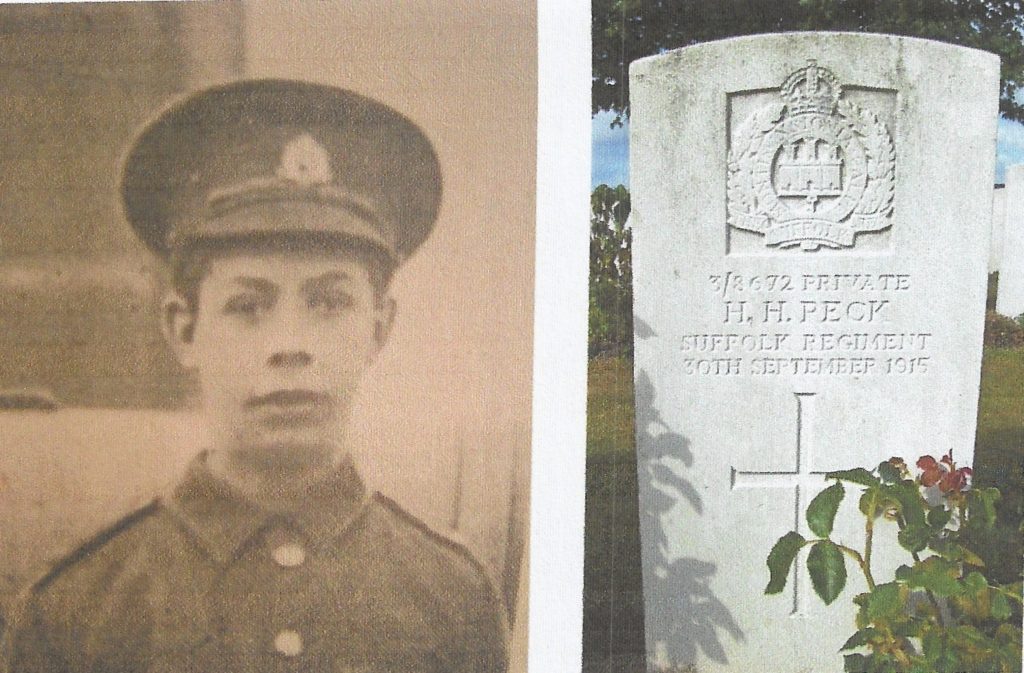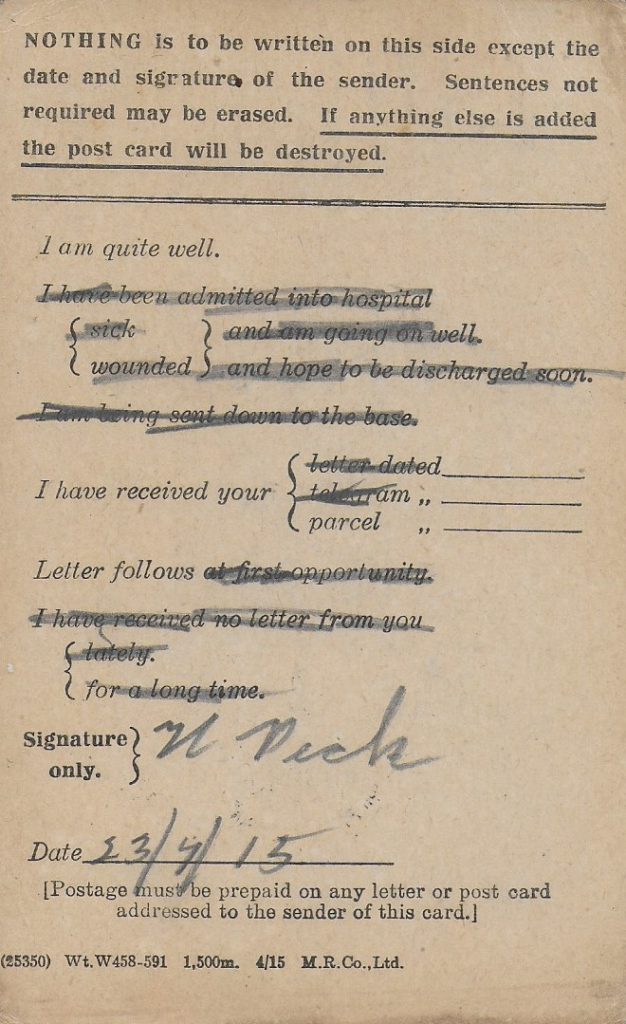3/8672 PRIVATE HARRY HERBERT PECK
2ND BATTALION SUFFOLK REGIMENT
KILLED IN ACTION
30TH SEPTEMBER 1915
AGE 20 YEARS
Very few of all the Halesworth men who fought during the Great War had been serving as professional sailors or soldiers during the lead-up to the start of hostilities in August 1914. One of those who had recently enlisted was Harry Peck. He left the home of his mother and stepfather Alfred Wright at 60 Chediston Street during the early months of 1914. He had then travelled to the Suffolk Regimental Depot at Bury St Edmonds to enlist in the 3rd (Special Reserve) Battalion which trained recruits prior to their being posted to one of the two regular army battalions. Harry Herbert Peck had been born in the town during the fourth quarter of 1895, the third son of Harry Senior, a general labourer, and Mary (née Took). Young Harry had been barely eighteen months old when his father died in 1897 at the age of forty-seven years. This had left Mary to raise four children, all under the age of thirteen years, on her own. In 1906 she had married Alfred, with whom she went on to have a further three children. During the early years of the 1900s, Chediston Street, known by the locals as Cherry Bow, where the Wright family were living, had over a number of years gained a bad reputation, with many of the families that lived there occupying small terraced cottages in a series of yards that ran off the street. Many of these properties were run down and overcrowded, gaining for the area the title of the slums of Halesworth. Enlisting in the army would have been seen by Harry as a way out of poverty. After leaving school he had found work in a low-skilled job as a sack maker for Dennington and Co Ltd, sack, rope and tent manufacturers, of London Road, Halesworth.
Within a few short months of Harry beginning his military training, war against Germany had been declared. The Regimental Depot had then been inundated with returning reservists and men rushing to enlist in the army. With barrack space now at a premium, those men, including Harry, who were already in training were despatched to Felixstowe on the Suffolk coast to continue to train, while at the same time preparing defences against possible invasion. While these preparations were in hand the two regular army battalions of the Suffolk Regiment were in the process of returning to England where they would then join the British Expeditionary Force which was now arriving in France and Belgium. At that time the 1st Battalion which had recently been sent from Egypt to the Sudanese city of Khartoum, with the 2nd Battalion as part of the 5th Division were based at the Currah training ground in Ireland. Here, within days, they were being transported to France where they landed at Le Havre on 16 – 17th August 1914. After their arrival they were then sent with all speed to the town of Le Cateau close to the French/Belgian border. The story of how the 2nd Suffolks fared during the next few months can be seen in our previous story of Edward Grice, who died of wounds on 4th March 1915. Needless to say, the 2nd Suffolks, by early December 1914, were in dire need of replacements in both Officers and Men. In the meantime, the training of those men desperately needed had been stepped up, with returning reservists and newly trained soldiers being sent out to the 2nd Battalion in drafts of varying numbers. On 27th December Harry, with Eddie Grice, landed in France after which they were transported to the Belgian village of Westoutre where their new battalion had been reforming and resting over the Christmas period.
Over the following months Harry with his comrades, was involved in several bloody battles which he appeared to have come through without a scratch. 25th September 1915 would go down in British military history as the opening day of the Battle of Loos, in which the 2nd Suffolks now serving in the 3rd Division played their part. On the second day of the offensive half of the Battalion moved into front-line trenches in the area of Sanctuary Wood, with the remaining companies to their rear in the support line. During the night of 28th September the Germans, who had spent some time tunnelling under the British front-line positions, detonated a mine under the section of the line held by the Suffolks’ neighbouring battalion of the 4th Middlesex Regiment. In the immediate aftermath of the explosion men of the 2nd Battalion rushed to the crater’s edge in preparation for a German attack that would normally follow. On this occasion no such assault developed so that, after a defensive barrage fired by the British artillery ceased at 3.15pm, the Divisional Commander gave orders for the 2nd Suffolks with the 2nd Royal Scots and the 4th Middlesex to carry out an attack on the German front-line. At zero hour, as the men climbed out of their trenches, they were met by a hail of rifle and machine-gun fire. Still maintaining their advance, the men of the three battalions eventually came up against the enemy’s barbed wire defences, which had remained virtually intact after the British artillery barrage. Unable to get any further forward, the men of the 3rd Divisions 8th Brigade were forced to withdraw. It would have been when they were safely back in their trench that the nominal roll was called. This showed that this one attack had cost the 2nd Suffolks in excess of one hundred and twenty-five casualties, which sadly included young Harry. After his death, Harry’s remains would have been found and identified. Today he lies at rest in the New Irish Cemetery in the West Viaanderen region of Belgium.
In July 1918 Harry’s mother Mary was granted a small weekly pension in the name of her son. It was initially valued at 3s6d (18p). Then in November 1918, it was increased to 5s0d (25p). On 21st August 1919 she also received the second sum of a gratuity that totalled £6.7s.3d (£6.36p). Also, as with the other next of kin of those who had lost their lives, she would have been entitled to claim her son’s medal entitlement of the 1915 Star medal trio with his named bronze memorial plaque and scroll.
The 1915 Star medal trio are now part of a private collection of items dedicated to the memory of all of those who left our small Suffolk market town to do their duty during World War One, while the memorial plaque and scroll have yet to be found.
Regrettably the death of her son was not the only loss Mary would have suffered. Eleven months prior to hearing of Harry’s death, she had received the news that her younger brother, Harry Press, had been killed on 27th October 1914 (see his story).
This is a copy of an original Field Service postcard
sent from Harry to his mother on
23rd July 1915. Within weeks Harry would have lost his life.



